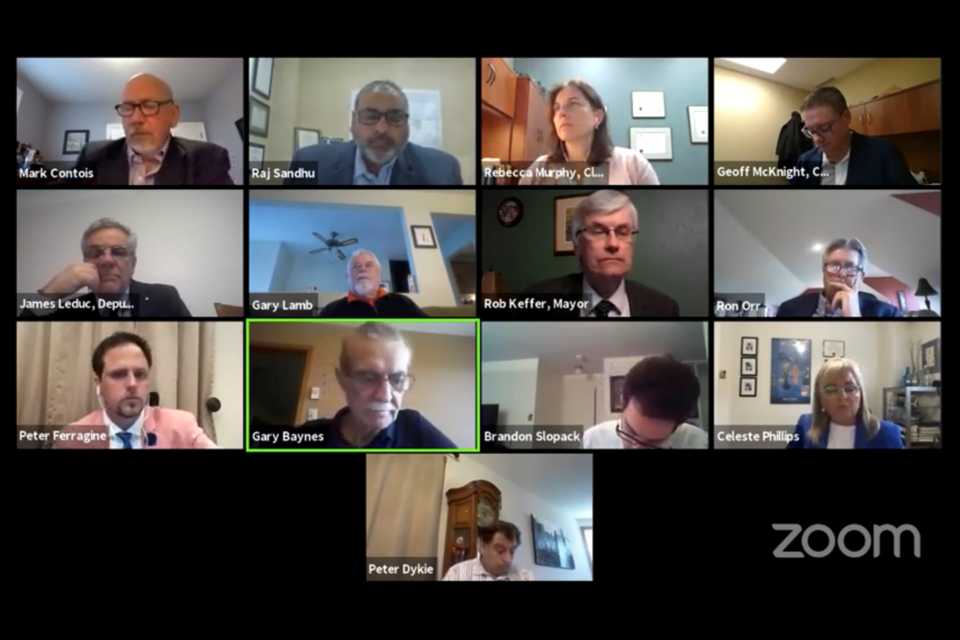The Town of Bradford's final 2020 property tax rate has now been set, reflecting both the final Provincial Education tax levy and the County of Simcoe's annual levy. The result is a 3.11 percent increase in residential property taxes for 2020 - up from the estimated increase of 2.95 percent, initially approved by town council in January.
In the Committee of the Whole portion of Council on Tuesday evening, councillors heard the reasons for the increase.
The budget hasn't changed, Treasurer Ian Goodfellow told council. What has changed is the weighted assessment - the tax ratios that divide up the tax burden among commercial, industrial, institutional and residential properties.
The County of Simcoe has changed the weighting of its assessment - reducing the burden on commercial and industrial properties, leading to an increase in the Residential tax rate to make up the shortfall.
"We’ve recalculated the assessment policies and don’t have much weighted assessment as we thought we did," said Treasurer for BWG, Ian Goodfellow - resulting in a shortfall of $19 million in assessment. "It does equate to just shy of seven dollars per home (per year). Unfortunately that’s the way the numbers played out at the end of it all."
The County of Simcoe approved a total levy of over $176 million, divided among its 16 member municipalities. Bradford West Gwillimbury taxpayers will be paying 11.95 percent of that total, or about $21.035 million - an increase of 5.18 percent, over the 2019 levy.
Added to the Municipal levy, Police Levy, Conservation Authorities, and Provincial Education tax, the overall tax increase comes to 3.11 percent - adding another $6.94 to the bill for an "average" home in BWG.
"This works out to 58 cents per month on the average house," noted Coun. Gary Lamb. "I'm not prepared to open this up and debate for 58 cents."
"That's 58 cents on top of the tax that's already there," said Coun. Mark Contois, asking "why we're not seeing any kind of tax rebate" from Simcoe County, since the county cut garbage and recycling collection from weekly to bi-weekly.
"We can argue all we want. The county’s done it and we can’t change it," said Deputy Mayor James Leduc, noting that the savings from waste collection have already be reallocated to new hires and education. He pointed out that residents can still set out the same amount of garbage, just on a different schedule.
Mayor Rob Keffer explained that the county was initially $5 million over-budget on garbage collection, as a result of trying to maintain service after the contractor experienced "labour issues." That has now been offset by the shift to bi-weekly collection, resulting in costs that are $1.1 million under budget - but there has been no reduction in the levy.
"The Deputy Mayor and myself are just two members up there (on County Council)," Mayor Keffer said, explaining that they had both voted against the increase in the county levy - and that the town has "done our best to relieve our residents of any tax burden," by delaying tax due dates by 60 days, and waiving late fees and penalties for 90 days due to COVID-19.
Coun. Gary Baynes asked if the town could use some of its 2019 year-end surplus to absorb the tax increase, and "offset the Simcoe surprise.".
Goodfellow noted that council has already allocated $300,000 of the 2019 surplus to mitigate the 2020 tax increase; a further $81,000 would be needed to offset the increase resulting from the county revisions.
Asked for the amount of the surplus, Goodfellow said the numbers were still under audit, but would certainly be in excess of $381,000, if council wanted to proceed.
In response to a question from council, Clerk Rebecca Murphy explained that would require a vote to reconsider and amend the budget approved on January 21, 2020..
"I share the frustrations of our residents," said Coun. Raj Sandhu, noting that BWG and other South Simcoe municipalities "pay extra" in taxes but get no breaks from the county. However, he opposed using more of the year-end surplus to offset taxes "because we don't know the costs of dealing with COVID" in 2020.
Leduc agreed. "I am not sure I want to reopen this budget. I think we have some real hard work in the coming year," he said, referring to the economic hit of the pandemic.
"We did reopen it (the budget) in January and helped our residents significantly," Mayor Keffer said. "I think it would be pretty tough to reopen the budget we worked so hard on."
The mayor urged council to look at other ways to assist residents, moving forward. He noted that MPAC has frozen assessment values for 2021, which should mean a zero percent increase next year, if the county can also be persuaded to hold the line.
"At this time, I think that the best course of action is to accept this tax by-law and look at innovative ways moving forward to help our residents, to try and get the county tax increase lower for next year," Keffer said.
Councillors in Committee of the Whole recommended approval of the final tax rate by-law, which comes back for a vote at the next meeting of council.



